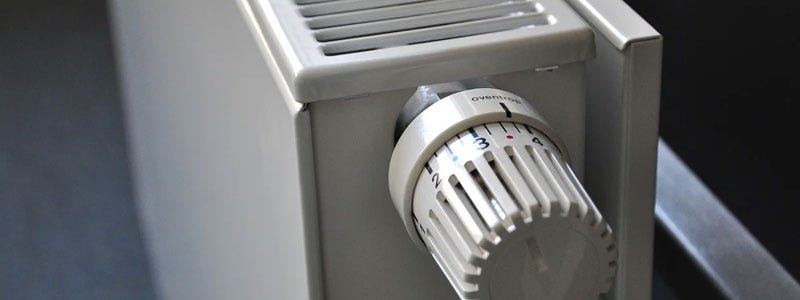Why is my gas bill so high?
According to British Gas, the average monthly gas bill for a medium use household is £36.30. However, whatever your family's average bill, if you've had a gas bill come through recently, it's probably much higher than a bill for the same period last year.
The Covid-19 / coronavirus situation has inevitably taken it's toll on our gas bills in 2020. Because most of us have been based at home over the last couple of months, our behaviours are very different from what they were a year ago.
Increased use of central heating
Being home during the day when normally you might be out at work, has probably meant you've switched the central heating on more regularly.
Though we have had some warm weather recently, there have certainly been plenty of days when we've needed some warmth from our radiators.
Being stuck inside means we've also been much more stationary than usual. Whether it's sat on the sofa watching Netflix or at a desk trying to do some work, a lack of movement is naturally going to make us seek heat from our central heating systems.
More baths and showers

Not to imply that you don't wash much under normal circumstances, but self-quarantining at home will inevitably lead to more water usage.
Because you don't have to be at the office or dropping the kids off at school, it opens up the possibility of taking longer showers. You might also find yourself having a shower in the morning and then again before you go to bed. This could be to relax or simply out of boredom
This extra time also means you can fill up your bath, light some candles and have a long soak in the tub. If you're experiencing flu-like symptoms, then a hot bath can help to relieve some of the pressure.
Another common scenario are those people who usually shower at work or the gym and are now doing it at home, especially if you've been indulging in some YouTube workout videos to stay fit.
If everyone in your household is bathing more and for longer, an increase in hot water usage is expected, as is a subsequent increase in your gas bill.
Increased cooking and kitchen use
One of the most positive outcomes of the Covid-19 lockdown is the motivation to get creative in the kitchen.
Whether it's rolling out your pasta doughs, baking a wholemeal loaf or discovering the joys of pestle and mortaring your way to some pesto, kitchens up and down the country have been taking a pounding.
While this is fantastic for getting people in touch with their healthy, culinary side, if you've got gas hobs then it's likely they've been on overdrive. Multiple hobs blasting out all at once are going to play their part in increasing your gas bill.
Even if you have electric hobs, all that cooking unfortunately creates a massive amount of washing up. If you're using the sink to wash up, hot water will be needed to get those pots and pans clean and ready to be used for the next meal.
Ways to reduce your gas bill
Just because your gas bill has increased recently, it doesn't mean they have to stay at that elevated level, even if you do need to stay at home for a while longer.
Below are some simple things you can do to help keep your extra gas usage under control.
- Keep hot showers to under 5 minutes
- Use a bowl or a plug in your sink instead of leaving the tap running
- Put on a jumper instead of your heating
- Don't leave your heating on 24 hours a day
- Turn your thermostat down by 1 degree
- Don't leave your immersion switch on all day
- Use Thermostatic Radiator Valves
Upgrade your radiators

One of the best ways you can reduce your gas bills over the long term is by having new radiators installed in your home.
This is especially applicable if your radiators are over 15 years old. Radiator technology has come a long way over the last decade and radiators are more efficient than ever before.
Modern radiators are very good at getting up to their desired temperature quickly and with a much lower water content than in years gone by.
Your old radiators may be much less efficient than you think, unnecessarily using a lot of hot water and therefore gas. Old radiators can become very corroded inside, resulting in a brown, metallic sludge forming at the bottom of the radiator. This can cause the rad to be cold at the bottom and often causes people to try and compensate for the lack of heat by turning up their heating - using even more energy.
Installing fresh new radiators and ensuring your heating system is regularly maintained and topped up with chemical inhibitor will help your heating run smoothly and efficiently over the long term.
RELATED ARTICLES
• Eco-friendly and green energy radiator options
